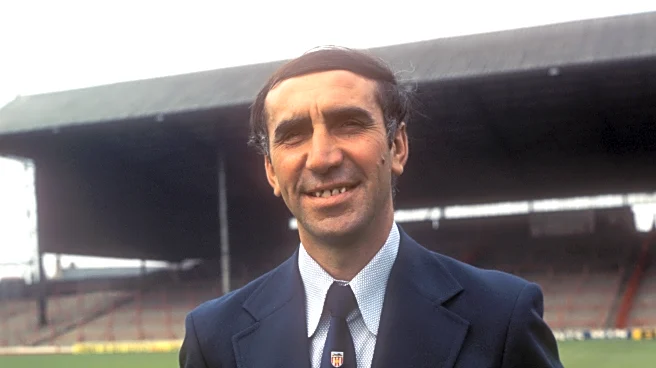Sunderland were coming off the back of a very frustrating draw at Ashton Gate, where they had dominated the game but failed to convert a number of good chances and then were caught out by a quick free-kick in the dying embers of the game.
“I have never seen manager Bob Stokoe so upset as he was on Saturday night”, was how the Journal’s Len Hetherington described the Sunderland boss at the end of this game. Stokoe had come out to speak to the press after the game, but before he did, had wisely taken
a slow walk around the empty stadium to gather his thoughts and regain his composure.
Three draws in succession had taken the steam out of a pretty good start to the season and even though two wins had followed, the Bristol City result saw Stokoe clearly concerned at the number of draws and chances that were going a-begging.
Another irritation for the boss would have been the number of points dropped against early season promotion rivals. West Brom, Norwich, Bolton and now Bristol had to varying degrees stolen either a draw and in West Brom’s case a victory, when it had looked like Sunderland were going home with the points!
It was typical of this season that irrespective of Bob Stokoe’s frustration, Sunderland were on their best run of results since Bobby Kerr’s debut had triggered an eight-game unbeaten run in the 1966/67 campaign.

New recruits Bob Moncur and Bryan ‘Pop’ Robson, two experienced players, who had played together in Newcastle’s European Fairs Cup winning team in 1969, had settled fairly well into the team. Pop was a Sunderland lad born and bred and could create as well as score goals. Moncur was an experienced Scottish international, whose positional savvy and game awareness looked to be complementing the colossus that was Dave Watson in defence, only six goals had been conceded in the first eleven league games.
Billy Hughes had started the season in fine fettle and already had seven goals to his name, Pop Robson had scored four and with Vic Halom on three and Bobby Kerr on two goals, we clearly had a goal threat we just needed to close out games, especially against our nearest rivals!
Sheffield Wednesday arrived, in trouble at the wrong end of the table. The Lads had played well at Hillsborough to win by two goals to nil at the beginning of the month. Since then, the Owls manager Steve Burtenshaw, had bought in the experienced Colin Harvey from Everton for £80,000. They were also trying to do a loan deal for Boro’s Eric McMordie, but that had not been concluded in time for this fixture.
Two players with Sunderland connections (one past, one future) were in the Wednesday line-up. Ken Knighton would captain the side, he would go on to coach and manage Sunderland to promotion in the 1979/80 season.
Also in the team was ex Sunderland youth team player Fred McIver. I had watched this lad play for our FA Youth Cup winning squad in 1968/69. Despite his obvious potential at Youth and reserve level, he played only one first team game for the Lads. I had been an excited spectator when he had made his debut against Preston at Roker Park in September 1971, I loved (and still love) to see the young lads getting a chance. Fred’s debut was eclipsed by another debutant in the same game (and up until very recently) our youngest ever outfield player Jimmy ‘Chico’ Hamilton, who as many will know scored the winning goal in the last knockings of this game.
McIver was given a free transfer at the end of his debut season and after a short spell in South Africa had been playing for Racing Jet in Belgium when the Owls manager Steve Burtenshaw had brought him to Hillsborough to bolster his defensive options for the start of this season.
Although there was some doubt about the fitness of Pop Robson going into this game, it was an unchanged team that took the field in front of a crowd that looked to be approaching 30,000 before kick-off. Stokoe had decided to give the eleven who had slipped up at Bristol a chance to redeem themselves.
What ensued upon kick-off was as exciting a forty-five minutes of football from the Lads as any fan could wish for.
By half-time we had scored three cracking goals and could have easily had another three or four, as we battered the beleaguered Wednesday defence with guile, skill, power and pace.
We could have been two-nil up before the ball was worked cleverly out of defence to Ron Guthrie on four minutes. He sped down the left wing and ripped a vicious cross into that corridor of uncertainty that goal keepers and defenders hate! Billy Hughes timed his run to perfection and powered the ball into the net just underneath the cross-bar for his eighth goal of the season. What a roar greeted this goal, we were off to a great start.
Sunderland were committed to an all-out attack with Kerr, Porterfield and Towers completely dominant in midfield. In a rare bit of respite, the Owls nearly caught us on the break but Monty raced out and smothered the ball at the feet of Potts charging in on goal.
Bobby Kerr then hit the byline before delivering what looked like the perfect cross to Vic Halom. He put his header just over the bar, it seemed like a great chance missed!

Halom though repaid Kerr minutes later, with a great crossfield ball that picked out Kerr ghosting into space unmarked. The ‘Little General’ controlled the pass and in one movement struck a ‘daisy cutter’ that sped past Peter Springett in the Sheffield goal and into the net off the post. He’s here, he’s there, went the chant in acknowledgement of the goal.
The Owls Tommy Craig, who had been a record British signing for a teenager in 1969, (and would go on to be fan favourite at Newcastle, whom he joined later this year) almost caught Sunderland on the break, as he hit a pile-driver that Monty just tipped around the post.
But Sunderland’s thirst for more goals brought reward just before half-time.
A lovely move involving some neat, sharp passing saw the ball worked to Porterfield whose tempting cross was nudged behind for a corner by Springett.
Porterfield delivered the corner right into the strike zone of Dave Watson. He always reminded me of an Olympic ski jumper as he headed the ball goalward in the box. He met the cross full on and powered it past Springett, who had little chance to move let alone save the attempt as the ball billowed the net.
Watson had been unusually off-form in the previous game against Bristol City, but had come back firing on all cylinders and thoroughly deserved this goal for his performance.
Three stunning goals ensured a rapturous half-time exit for the Lads. I would have been hard pressed to say which goal was the best, they were all so good in their own way.
In the way that games like this sometimes go, the second half settled down somewhat and the Lads coasted to victory, with Porterfield and Kerr in particular playing some silky stuff. Wednesday showed some resolve not to concede further and a Ken Knighton chance not long before the final whistle was the only concern as the points were won and we moved back into second place behind Manchester United.
Bob Stokoe was a lot happier in his post-match briefing under the lights at Roker Park, especially as the news that Manchester United had been beaten at Portsmouth. Our three – goal haul put us on twenty-two goals so far for the season, one more than United.
Next up was one of our rivals, Aston Villa at Roker Park the following Saturday. I was looking forward to the individual contest between Dave Watson and their centre-forward Sammy Morgan, a rough, tough all-action athlete.
The news that Richie Pitt was on the comeback trail that week was also good news, he had played in a reserve game against Bradford in which Chico Hamilton had scored our goal. Sadly his efforts would ultimately prove unsuccessful, we would not see our 1973 FA Final team ever play together again in a competitive game.
League Division Two | Date – 15.10.1974 | Venue – Roker Park | Attendance – 28,155
Sunderland 3 – 0 Sheffield Wednesday
Goalscorers – Hughes 4 minutes; Kerr 12 minutes; Watson 42 minutes.
Sunderland – Montgomery; Guthrie; Malone; Moncur; Watson; Porterfield; Towers; Kerr; Hughes; Halom; Robson. Sub – Finney.
Sheffield Wednesday – Springett; Rodrigues (Shaw 81 minutes); McIver; Thompson; Dowd; Holsgrove; Knighton; Potts; Harvey; Joicey; Craig.

















